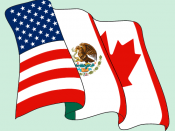The implications of the Canada-United States Free Trade agreement and the subsequent NAFTA agreement pertaining to Canadian trade with the United States.
The arguments in favour of these agreements include:
1) Comparative Advantage
The notion is that everyone will benefit when countries specialize and trade freely what they produce most efficiently. Less intervention by the government would enhance the process of free trade and help achieve the proper economies of scale.
2) Elimination of Barriers and Tariffs
NAFTA has eliminated barriers to trade and tariffs on most products, and formed a larger integrated market, building North American as one of the most competent regions in which to conduct business.
3) International Competitiveness
These agreements enhance Canada's goods and services. Additionally, these agreements improve access to the United States and Mexico and guarantee Canada's position as a prime location for investors to reach all of North American.
4) Competition
Under these agreements, Canada has more opportunities to develop and demonstrate their economic expertise, technical knowledge and leadership.
5) Economic Growth
Free trade stimulates economic growth, increases employment and boosts overall incomes in Canada.
6) Democratization
Because the agreement promotes discipline and transparency, pressing social problems (such as anti-dumping, environmental deterioration and labour rights) can be improved.
The arguments against these agreements include:
1) Loss of Manufacturing Jobs
A significant effect of the agreements would be the loss of manufacturing jobs and the shift of corporations and plants over to Mexico where cost of production are much lower than in Canada. This would seriously affect Canadian employment.
2) Overly Dependent on a Few Sectors
Specialization through comparative advantage would make Canada overly dependent on a few resources or products. This would upset the market and economic situation if demand falls in those areas.
3) Protectionism
Labour unions and domestic industries use this...


